Search Engine Optimization (SEO) is an absolute must for any successful online marketing strategy. It comes down to optimizing your website and content so that search engines can identify it easily, as well as making sure the material you’re providing matches up with the keywords you're aiming at.
By getting a good handle on SEO fundamentals, best practices in terms of optimization techniques, ranking criteria, and web traffic patterns, you make certain that your site appears high when someone does a search using popular search platforms like Google or Bing. With this know-how under your belt, you will be better placed - whether personally or professionally - to take full advantage of all the opportunities presented by today's booming digital marketplace!
What is SEO and why is it important?
Search Engine Optimization (SEO) basically involves optimizing a website or web page so that it gains greater visibility in search engine results pages (SERPs). This requires employing multiple strategies, like coming up with content having lots of relevant keywords, upgrading the quality code used for a site, getting backlinks from different websites, and improving the site's loading speed.
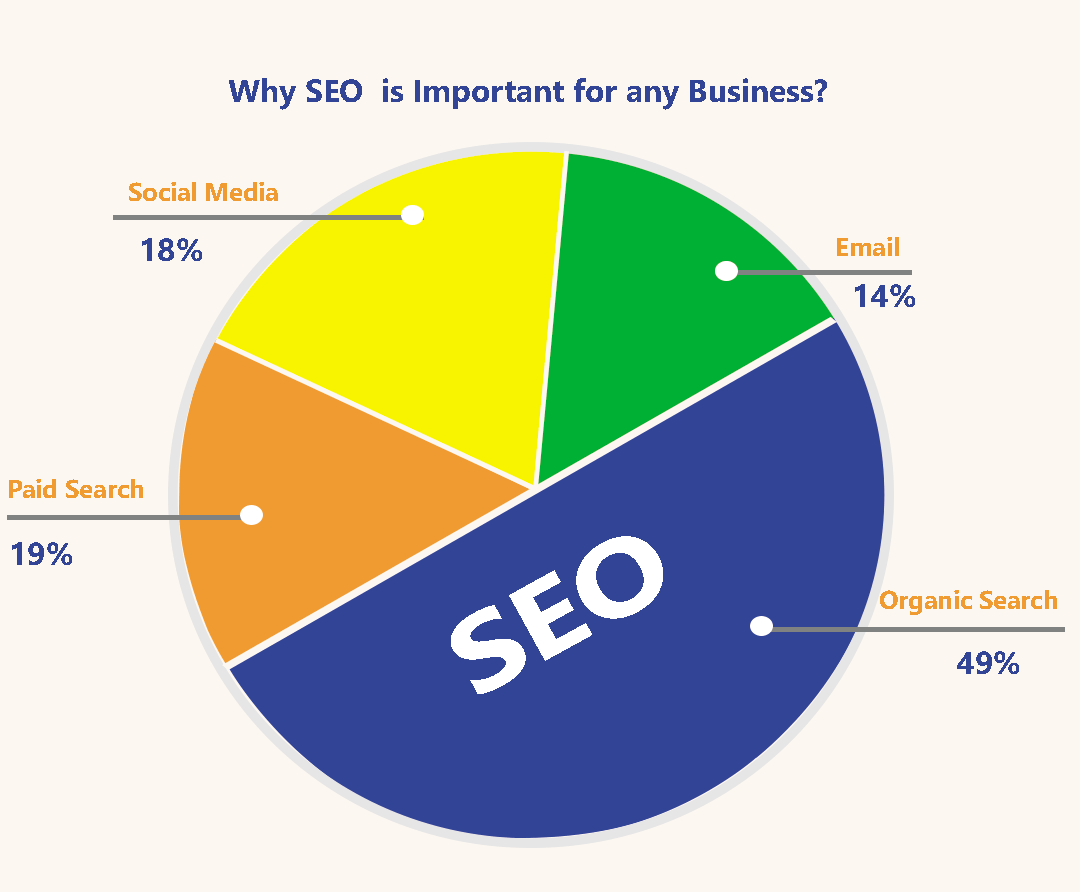
The role of SEO in improving Search Rankings
SEO plays a crucial role in improving a website's search rankings. Focusing on the key elements like keywords, titles, meta tags, and descriptions is crucial if businesses want to make sure their websites are optimized according to the latest best practices. When a website is properly optimized, search engines view it as a valuable resource and rank it higher in the search results. This not only helps them stand out from other companies who may not have taken care of properly optimizing their digital presence but also increases organic traffic through higher rankings on search engine results pages (SERPs).
The objective of SEO and its impact on Web Traffic
The ultimate objective is to get more organic traffic to any given website which would then produce leads and result in customers for related businesses. Organic traffic refers to visitors who find a website through a search engine's organic search results, rather than paid advertisements. By optimizing a website for search engines, it becomes more likely to appear in relevant searches, driving targeted traffic.
SEO has become one of today's most effective marketing tools. It can help increase brand awareness among potential customers who are actively looking for products or services related to what a company provides - there’s no denying its value! However it takes consistency before SEO efforts start paying off; while this might take some time at first, you'll be rewarded in greater amounts as your efforts continue.
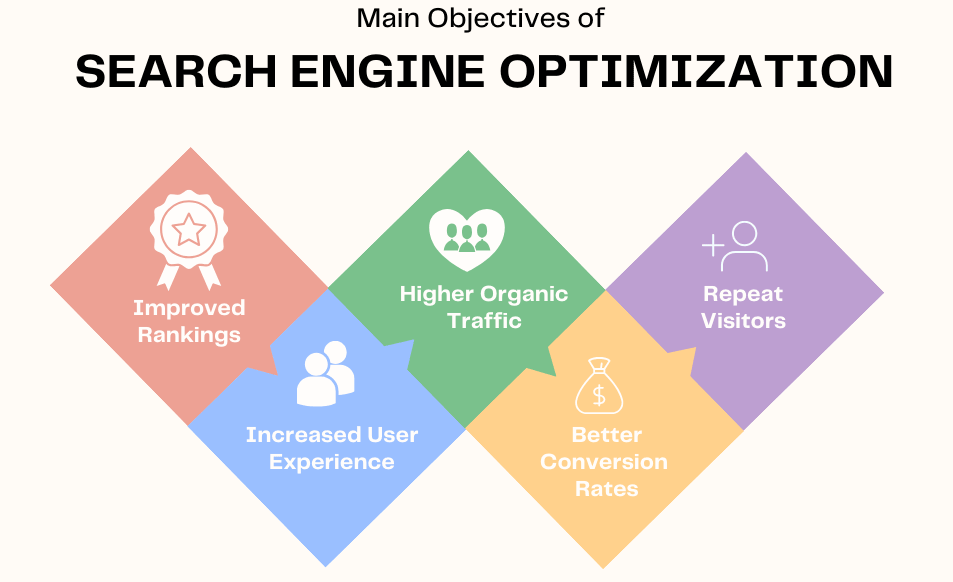
How do search engines work?
Search engines use complex algorithms to crawl and index websites, analyzing various factors to determine their relevance to search terms. Google for instance uses algorithms to decide which webpages should appear at the top of its search results page for particular queries such as “the best pizza near me” or “How do I start an online store?” These algorithms take into consideration numerous elements when considering a website's relevance towards a certain query - from the URL structure down to individual words used on the webpage itself. Pondering this deeply begs one question: How can we rank higher so that our web pages show up more often than not?
SEO can be broken down into 2 major classifications:
1. On-page SEO
On-page optimization refers to optimizing the content and HTML elements within a website. This includes keyword research, optimizing title tags and meta descriptions, using relevant headings and subheadings, and optimizing images and videos. On-page optimization helps search engines understand the content and relevance of a webpage.
2. Off-page SEO
Off-page SEO involves optimizing factors outside of the website itself, such as building quality backlinks from other websites, social media sharing, and online mentions of the website or brand. Off-page SEO signals to search engines that a website is trustworthy and authoritative, contributing to higher rankings.
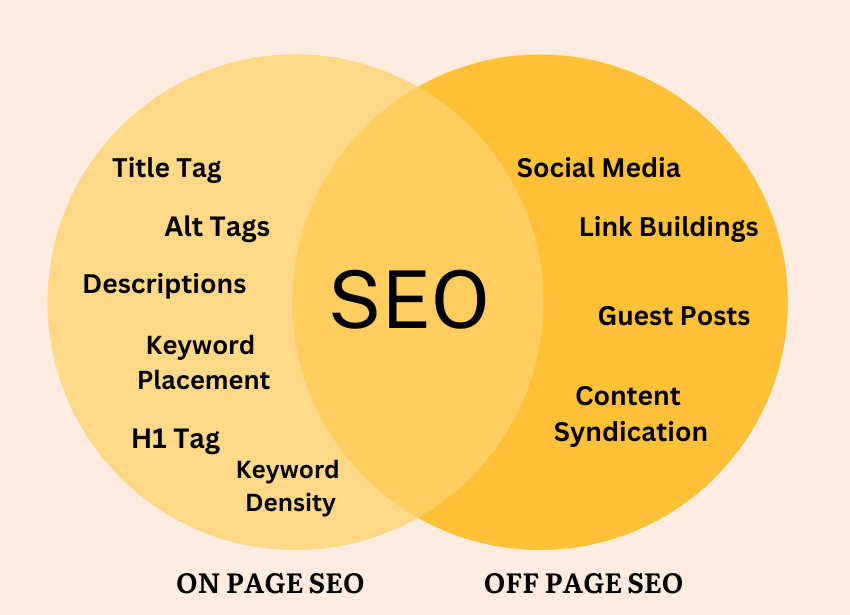
Decoding the Various Strategies for Success
It's absolutely essential for any business that intends to succeed online to comprehend the fundamentals of SEO. In order for you to reap maximum benefits from search engine optimization (SEO) strategies it is important for you to understand how each strategy works together in unison.
Understanding the technical aspects of SEO
Technical SEO involves optimizing a website's technical elements, such as site speed, mobile-friendliness, site architecture, and URL structure. These optimizations help search engines crawl and index a website more easily, improving its overall visibility and usability. Between optimizing your site for search and ensuring it is accessible on all device types, there are multiple tactics you can employ to ensure maximum visibility.
The best practices for implementing SEO strategies
It involves following best practices that are recommended by search engines.
1. Keyword Research & Optimization: It allows the discovery of what will bring more traffic in addition to content creation that appeals directly to users. To identify the target keywords with a high volume of searches, consider using Google AdWords Keyword Planner or other keyword research tools.
2. On-Page Optimization: Optimizing various elements on your website, such as title tags, meta descriptions, headings, URL structures, and content, based on the targeted keywords.
3. High-Quality Content Creation: Creating informative, unique, and engaging content that provides value to users can attract organic traffic and improve your website's search engine rankings. Additionally, regularly updating your content can help you stay relevant and boost your SEO efforts.
4. Building Quality Backlinks: Earning links from other reputable websites is an essential part of SEO. Building a strong backlink profile shows search engines that your website is trustworthy and authoritative. Obtaining backlinks can be achieved through guest blogging, content promotion, influencer outreach, and networking with others in your industry.
5. User Experience Optimization: It makes sure any mobile visitor has access to the exact same experience no matter if using a smartphone, tablet, laptop etcetera Plus technical site audits help identify issues such as broken links thus allowing improvements to be made accordingly without the worry of negatively impacting user experience overall.
6. Technical SEO: Optimizing the technical aspects of your website, including site architecture, URL structure, crawl ability, XML sitemaps, robots.txt, and schema markup, helps search engines crawl and index your site properly. Technical SEO also involves mobile device responsiveness, improving site speed, and fixing any technical issues that may hinder your site's performance.
7. Local SEO: For businesses targeting a specific geographic area, optimization for local searches is crucial. This involves creating a Google My Business profile, ensuring consistent NAP (name, address, phone number) information across directories, and optimizing content around local keywords. 8. Mobile Responsive Design & development: It makes sure any mobile visitor has access to the exact same experience no matter if using a smartphone, tablet, laptop etcetera Plus technical site audits help identify issues such as broken links thus allowing improvements to be made accordingly without the worry of negatively impacting user experience overall. 9. Social media integration/marketing campaigns: It helps target potential visitors who may not have otherwise found out about one’s page. 10. Monitoring and Analysis: Regularly monitoring your website's performance using tools like Google Analytics and Google Search Console can help identify areas for improvement. Analyzing key metrics like organic traffic, bounce rate, keyword rankings, and conversion rates provides insights into the effectiveness of SEO techniques.
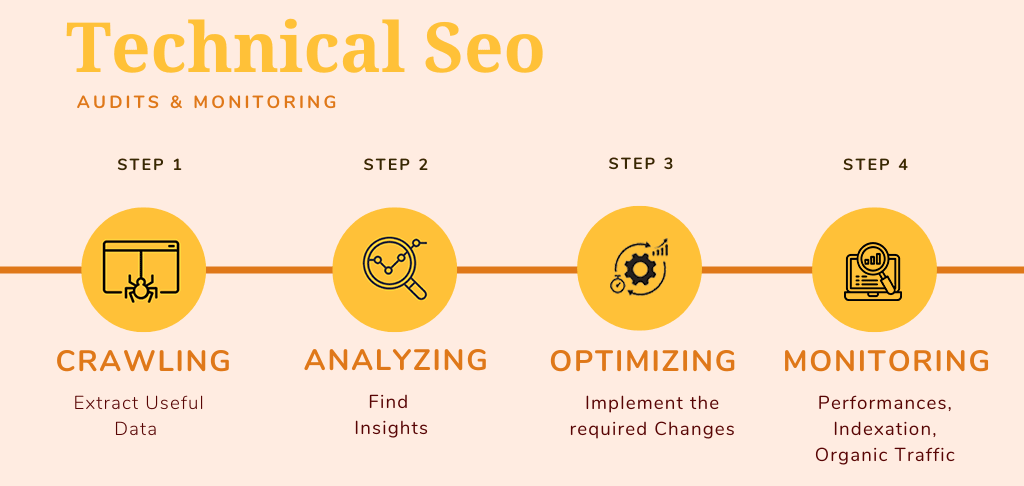
By implementing these strategies, you can enhance your website's visibility in search engine results, drive organic traffic, and improve your overall online presence. This includes creating high-quality and relevant content, conducting keyword research, optimizing website structure and navigation, using descriptive URLs, and ensuring a positive user experience. So, whether through SEO techniques or other means, updating with whatever works best always brings positive results!
Enhancing user experience on-site, and increasing engagement from visitors when they arrive at a website or blog post page as a result of an organic search engine like Google/Bing, etc, What's more, optimizing individual elements within each web page such as title tags meta descriptions also plays a role.
You might be wondering - How exactly do these pieces fit into the grand scheme of SEO? The answer lies in understanding how different components interact with one another so that you can create effective campaigns targeting any type of audience your business seeks.
For successful websites or blogs, businesses must use effective SEO tactics, create engaging top-quality content, target relevant keywords, use visuals strategically, and be consistently updated to provide up-to-date information for users searching on major search engines like Google and Bing.
Ranking Factors: Crucial Elements for Successful SEO
SEO ranking factors are the criteria that search engines consider when ranking websites. website loading speed, mobile-friendliness, and the presence of quality backlinks. Ranking factors are particularly important when it comes to SEO; these rank your website in SERPs depending on which keywords people use while searching. These include keyword relevance, quality and uniqueness of content, backlinks from external websites, internal linking structure of a page, website authority, its loading speed as well and user experience among many other things. All of these have an effect on where your site shows up in search results or not at all!

For better rankings in SERPs, various factors must be taken into consideration
1. Using focused keywords
2. Composing unique titles with information that is relevant
3. Employing suitable metadata tags
4. Connecting internal links between related articles or web pages
5. Adding outbound links from reputed sources
6. Creating a fast page loading speed
7. Providing an easy navigation system
8. Offering quality customer service
The role of content marketing in SEO
Content marketing plays a significant role in SEO. By creating high-quality content that is relevant, informative, and useful to users, a website can attract more organic traffic and increase user engagement. Well-optimized content also has a higher chance of getting shared and linked, further boosting its SEO impact.
How Web Traffic Influences SEO Outcomes
Although there are multiple aspects to SEO, web traffic plays an important role in generating successful outcomes. Knowing how website visits determine SEO results can guide website owners and marketers when creating marketing plans that will help their sites appear higher on search engine listings.
Exploring organic search and its benefits
Organic Search Engine Traffic is one that comes directly from engines and is considered to be the most valuable type of website visitor. It's because they visit your site with the intention of finding specific information or products that can be found there. Besides this, it appears like organic visitors stay on a web page for longer periods than other types of internet surfers which is a good indicator of overall engagement level in relation to content you post on your webpage.
Isn't it interesting how those simple things have real meaning when bringing in new customers?
On the flip side, getting leads or conversions from social media networks, paid searches and external websites may not always be top-notch but it can still help you build recognition for your brand name while increasing organic searches eventually.
Moreover, when looking to get the best SEO results possible you also need to take into account how each type of visitor interacts with what is on offer as soon as they access your website. What kind of experiences are they having? What are visitors doing once they land at your site? These questions should all be taken into consideration in order to make sure that everyone's experience turns out great.
Common Pitfalls and How to Avoid Them in SEO Strategies
One of the major hurdles these businesses must jump when dealing with SEO is avoiding common pitfalls - which can be due to incorrect ideas about how search engines work or simply not adhering to best practices!
Some websites might think they can game the system by using techniques like keyword stuffing or copying and pasting content, hoping it will help their ranking. Unfortunately, though, this often leads to getting slapped with a penalty from search engines which simply has the opposite effect - leaving rankings even worse off than before!
Businesses also tend to overly rely on paid advertising as opposed to sources of organic traffic such as SEO optimization & content writing.
It's important to address any issues such as broken links, slow loading times, poor meta descriptions, and an inadequate site structure; all of which can impact the success rate.
Furthermore, if you don't understand what keywords are most relevant to your target audience then this could lead to a whole lot of wasted time and money trying (and failing!) with SEO techniques.
Measuring Impact: Monitoring Your Web Traffic and Rankings
There are various SEO tools available that help track website performance and rankings. These tools provide valuable insights into website traffic, keyword rankings, backlink profiles, and user behavior. Tools such as Google Analytics offer incredible insight into how visitors are engaging with your site - page views, visitor numbers, bounce rate etcetera can all be observed through this platform. Additionally, Google Search Console is a great resource if you're looking at measuring keyword ranking on search engines like Bing or even Google itself! Using tools like Ahrefs and Moz Pro can give businesses an understanding of how they stack up against their competitors in terms of organic search traffic.
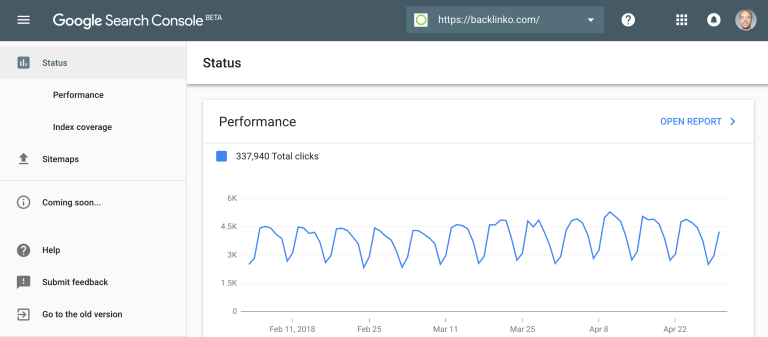
Understanding search queries and organic search results
Search queries are the words or phrases that users enter into search engines to find relevant information. By understanding, organic search traffic, businesses can optimize their websites to appear in relevant search results and attract targeted visitors.
Utilizing Google Search Console for SEO insights
Google Search Console is a free tool provided by Google that helps website owners monitor and maintain the presence of their websites in Google Search results. It provides valuable insights into website performance, raw errors, and indexation status. This data can be used to optimize a website's SEO tactics and improve its visibility on Google.
FAQs
Q: What is SEO?
A: SEO stands for Search Engine Optimization. It is the practice of improving a website's visibility and ranking on SERPs to increase organic (non-paid) traffic to the site.
Q: Why is SEO important?
A: SEO is important because it helps businesses improve their online presence and reach more potential customers. By optimizing a website for search engines, businesses can increase their visibility, attract more organic traffic, and ultimately generate more leads and sales.
Q: What are the types of SEO?
A: There are three main types of SEO: On-Page SEO, Off-Page SEO, and Technical SEO. On-page SEO involves optimizing content and HTML source code on a website. Off-page SEO focuses on building backlinks and promoting a website through external channels. Technical SEO deals with the technical aspects of a website, such as site speed and mobile-friendliness.
Q: What are some best practices for SEO?
A: It includes: conducting keyword research to identify relevant keywords, optimizing website content and meta tags, improving website speed and mobile-friendliness, building high-quality backlinks, and regularly monitoring and analyzing website performance and rankings.
Q: How do search engines determine rankings?
A: Search engines, like Google, determine rankings based on a variety of factors, including relevance and content quality, website authority, and technical optimization. Search engine algorithms evaluate these factors to determine the most relevant and useful websites to display in the search results for a given search query.
Q: What is the role of SEO in digital marketing?
A: SEO plays a crucial role in digital marketing by driving organic traffic to websites and improving their visibility in search engine results. It helps businesses increase their online presence, attract potential customers, and ultimately achieve their marketing goals.
Q: What are some SEO ranking factors?
A: SEO ranking factors include website relevance and content quality, backlink profile, website authority and trust, lead experience, website speed and mobile-friendliness, structured data, social signals, and technical optimization.
Q: What is the goal of SEO?
A: The goal of SEO is to improve a website's visibility and rankings in search engine results pages (SERPs), ultimately driving more organic traffic to the site. The ultimate goal is to attract and convert potential customers, leading to increased visibility, brand awareness, and business revenue.
Q: What is on-page SEO?
A: On-page SEO refers to the optimization of individual web pages to improve their visibility and ranking on search engine results pages. It involves optimizing content, meta tags, headings, URL structure, and others to make the page more relevant and valuable to both search engines and users.
Q: What is off-page SEO?
A: Off-page SEO involves activities done outside of a website to improve its visibility and ranking on SERPs It primarily focuses on building high-quality backlinks, social media promotion, and other external factors that can impact a website's authority and reputation in the eyes of search engines.
To wrap it up, SEO - Search Engine Optimization is the process of tweaking a website to make it more visible on search engines such as Google and Bing. It includes studying keywords, comprehending ranking factors, authoring content that fits in with search engine's algorithms, plus putting into practice several SEO tactics to help your webpage rank higher in organic searches. By applying effective SEO practices you can undeniably boost your website's visibility and web traffic drastically.
